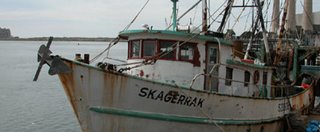I asked myself should I feel bad?
Since they’re endangered or threatened or some such
I ate a coho salmon
I dove into it, a strong, fast plunge
No worry, no regrets
I ate a coho salmon, so familiar
It tickled deep memories of others
How many, hundreds? thousands?
I ate a coho salmon, it was like stepping back in time
Back to when they swam thick in Oregon’s coastal rivers
And I didn’t have to wrestle with guilt.
I ate a coho salmon and it was good
I could feel the forests and rivers and clouds
And a better world where we both live
I ate a coho salmon, and I’ll do it again
So I don’t forget
 Morals, scruples, and eating endangered fish
Morals, scruples, and eating endangered fishI guess I should explain myself. I ate a coho salmon. I bought it at the seafood counter of my local supermarket. Somebody else caught it and sold it for about $2 per pound and it found it’s way to the seafood counter for 8.99 per pound. I was about to fly east on Alaska Airlines flight 2, Seattle to Washington, DC, and spend days arguing with people about fish and laws and management and what should we do. All of a sudden I knew what should I do, I should eat a coho salmon, just like I’ve done a thousand times before. To fortify myself, to permeate myself with fishness, to go deep and meditate on thousand year old trees and rivers full of fish. Then I might do better at having the right stuff brewing in me while I stumble through my fish-saving business in the nation's capital.
I know I should probably get all rational and think about whether or not this was a sustainable purchase and if I’m using my consumer power to support the right things. But it wasn’t a head thing, it was an instict thing. I grew up eating coho salmon. The memories of it run deep in me, oh yes.
......Seven years old I waded waist deep into the swift cold creek, my dad had a big fish on, it had dropped down a couple of pools (we followed) and now there was a barbed wire fence, we could go no further down. If the fish went downstream under the fence it would break off. “Wade in there scare it back up if it heads under the fence.” I took the net and got in the middle and waited. Sure enough it started coming downstream and I splashed and thrashed but it didn’t turn, it kept coming so I netted the ocean-bright still-strong fish. Then commenced a prodigious epic struggle as the fish splashed and smashed and boy that I was I tried to drag it to shore. It seemed to take forever. Reaching the bank among splashing and thrasing suddenly all went quiet. I stepped one foot on shore, net in hand but there was no fish. What the? Hot to spawn , that fish had torn through the bottom of the net, dropped into the water, under the fence and broken free. Lived to spawn I expect, with a fiery spirit like that. The one that got away....
It’s good to have that in mind when I think about what next, what now? If I give up coho salmon to them that have driven them down, then I’ve lost too much, I feel like I’ve lost hope. I want to do the right thing, and mostly I’ll not molest them. In fact, I'll spend my fishing energy on saving fish instead of catching them. But every now and then, at the right time, I think I need a small ceremony. I ate a coho salmon, and it was good. Now it’s part of me. I’ll save the coho salmon, because I must. Because what we do to them, we’re doing to ourselves.







 Larry Brand thinks red tides are getting worse thanks to nutrient runoff caused by people
Larry Brand thinks red tides are getting worse thanks to nutrient runoff caused by people







 Fishermen paid to stop destructive bottom trawling off California
Fishermen paid to stop destructive bottom trawling off California
